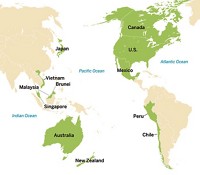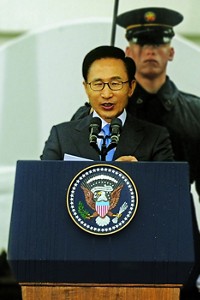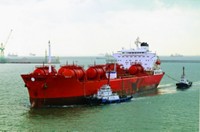Advertisement
Grab your lab coat. Let's get started
Welcome!
Welcome!
Create an account below to get 6 C&EN articles per month, receive newsletters and more - all free.
It seems this is your first time logging in online. Please enter the following information to continue.
As an ACS member you automatically get access to this site. All we need is few more details to create your reading experience.
Not you? Sign in with a different account.
Not you? Sign in with a different account.
ERROR 1
ERROR 1
ERROR 2
ERROR 2
ERROR 2
ERROR 2
ERROR 2
Password and Confirm password must match.
If you have an ACS member number, please enter it here so we can link this account to your membership. (optional)
ERROR 2
ACS values your privacy. By submitting your information, you are gaining access to C&EN and subscribing to our weekly newsletter. We use the information you provide to make your reading experience better, and we will never sell your data to third party members.
Policy
U.S. Trade Policy Shifts
Enforcement of trade rules is Administration's top priority
by Glenn Hess
April 27, 2009
| A version of this story appeared in
Volume 87, Issue 17

RATHER THAN pursuing an ambitious free-trade agenda with the zeal characteristic of recent Administrations, the Obama Administration is promising that it will take a harder line with U.S. trading partners, vowing to strictly enforce existing trade agreements and push for tougher labor and environmental provisions in pending and future deals.
"I do not come to this job with what I have called, in some of our meetings, 'deal fever,' " Ronald Kirk told the Senate Finance Committee last month at a hearing held to consider his nomination to be the new U.S. trade representative. "We're not going to do trade deals just for the sake of doing deals."
Kirk, the former Dallas mayor whose appointment to the Cabinet-level position was confirmed by the Senate on March 18, told lawmakers that he would focus more on making sure that other countries live up to the commitments they have made in international trade agreements than on negotiating new deals that open markets to U.S. exports.
"I believe in trade and will work to expand it. But I also know that not all Americans are winning from it and that our trading partners are not always playing by the rules," Kirk remarked. "This Administration's starting point on trade will be to ensure the strongest possible enforcement of existing rules."
That would signal a shift from former president George W. Bush, who championed the benefits of free trade and endeavored to negotiate new bilateral agreements. The U.S. currently has free-trade pacts with 14 countries. Only three such accords were in force when Bush took office in 2001. U.S. business groups fear they will be put at a competitive disadvantage, however, if trading partners such as the European Union push forward with new trade agreements and the U.S. stays on the sidelines.
President Barack Obama tapped Kirk in December to lead the White House Office of the U.S. Trade Representative, an agency with more than 200 employees. The office is responsible for negotiating directly with foreign governments to create trade agreements, resolve disputes, and participate in global trade policy organizations.
In announcing the nomination at a press conference in Chicago, Obama emphasized that although the success of American business depends on "strong, robust trade and open doors for American products," any agreement he signs "must be written, not just with the interest of big corporations in mind, but with the interests of our whole nation and our workers at heart."
During his tenure as mayor, Kirk saw both "the promise of trade but also its pitfalls," Obama said. "Ron brought different groups together to create jobs, invest in the community, and spur economic growth," he remarked. "As a leader, negotiator, and principled proponent of trade, Ron will help make sure that any agreements I sign as President protect the rights of all workers, promote the interests of all Americans, and preserve the planet we all share."
Kirk served as mayor of Dallas from 1995 to 2001, when he stepped down to launch an unsuccessful Senate bid. Since then, he has been a partner in the Dallas office of the Houston-based law and lobbying firm Vinson & Elkins (V&E). He also spearheaded Obama's presidential campaign in Texas last year.
"I can't imagine anyone better suited for the job of U.S. trade representative," says Veronica S. Lewis, a V&E litigation partner. "Ron has always been passionate about improving the lives of workers, and he combines that commitment with a true understanding of business and business needs."
Obama turned to Kirk, who is not well-known in Washington trade circles, after his first choice, Rep. Xavier Becerra (D-Calif.), a senior member of the House of Representatives Ways & Means Committee, turned down the job. Becerra said he was concerned that trade would not be a high enough priority for the Obama Administration.
UNLIKE MANY of his trade representative predecessors, Kirk has no experience in negotiating major trade deals or enforcing them, and his area of legal practice is public policy and finance, not trade law. But U.S. business leaders have welcomed Kirk, who as mayor was an outspoken booster of the 1994 North American Free Trade Agreement (NAFTA) among the U.S., Canada, and Mexico.
"There's not a trade-off made between supporting free and fair trade and fighting for American workers. We have to do both."
Kirk has demonstrated "a keen understanding of the benefits of trade as an engine for growth and jobs," says Thomas J. Donohue, president of the U.S. Chamber of Commerce. "Rebuilding the bipartisan consensus on trade will be 'job one' as U.S. trade representative, but in the end, his mission will be to open overseas markets to American goods and services."
John Engler, president of the National Association of Manufacturers, calls Kirk "an inspired choice" to lead the U.S. in global trade negotiations. "Texas is our largest exporting state, and Ron Kirk has seen firsthand how important free-trade agreements, such as NAFTA, are to our economy," he says. "Knowing he has a close relationship with the President sends a message that our national commitment to international commerce remains strong."
Not everyone was enthusiastic about Kirk's nomination. Obama's choice of an avowed free-trade advocate disappointed labor and environmental activists, who blame unfair trade deals for job losses and increased pollution.
"Whether Ron Kirk is a good choice for trade representative will be determined by his ability to deliver on President Obama's pledges to the American public to create a new trade and globalization policy that benefits more Americans," says Lori Wallach, director of Public Citizen's Global Trade Watch, an advocacy group that has been critical of free-trade agreements.
At the Senate Finance Committee hearing, Kirk made it clear that he would carry out Obama's trade agenda, saying he would not "simply pick up and implement" controversial free-trade agreements that the Bush Administration negotiated with Colombia and South Korea (C&EN, April 14, 2008, page 34, and July 9, 2007, page 7). Those pacts, which are strongly supported by the chemical industry and most other U.S. businesses, have yet to be approved by Congress. A smaller deal with Panama is considered less contentious and is more likely to be ratified this year.
During the presidential campaign, Obama echoed the public's largely skeptical attitude toward trade, saying he opposes the Colombia and South Korea agreements and wants to "fix" NAFTA by adding stronger labor and environmental protections.
Kirk said he sees "great opportunity" in Colombia, one of the U.S.'s staunchest allies in Latin America. But the deal faces stiff opposition among many Democrats who say the Colombian government has not done enough to halt violence against union members. Kirk indicated that the Administration would try to salvage the pact. "The President has made clear that Colombia is a friend and ally, and we will work with them in that spirit," he said.
U.S. manufacturers have urged approval of the Colombia deal, which they say would level the playing field for American exports in a fast-growing market. Although most Colombian products already enter the U.S. duty-free under an existing trade preference program, the new pact would eliminate tariffs on more than 80% of U.S. shipments of industrial and consumer goods bound for the Andean nation, the second most populous country in South America after Brazil. The U.S. exported $2.3 billion worth of chemical products to Colombia in 2008.
"We would hope that this agreement could be considered on its economic merits and the tremendous benefits it would bring, not only to the chemical industry, but to American manufacturing in general," says Lisa M. Schroeter, director of international trade policy for Dow Chemical, which annually exports more than $300 million worth of products to Colombia.
Kirk was less optimistic at his confirmation hearing about the agreement with South Korea, saying the accord with the U.S.'s seventh-largest trading partner needs to be renegotiated. "The agreement as it is just simply isn't fair, and if we don't get that right, we'll be prepared to step away from that," he told the panel.
UNDER THE PENDING agreement, more than 90% of trade between the two countries in industrial and consumer goods would become duty-free within three years after enactment, with remaining tariffs eliminated within 10 years. The pact also would ensure that U.S. investors in South Korea have the same rights as Korean investors and that intellectual property rights are protected.
U.S. automakers have complained that the deal does not adequately address nontariff barriers that would continue to give Korean auto companies open access to the domestic market but largely keep American companies out of the Korean market. South Korea exported more than 600,000 cars and light trucks to the U.S. in 2008 and imported just over 10,000 American-made vehicles.
The chemical industry, which exported $4.9 billion worth of products to South Korea in 2008, wants to see chemical tariffs in the Asian nation eliminated as quickly as possible. South Korea is among the top 10 chemical-producing countries in the world and is the sixth-largest market for U.S. chemical exports.
Kirk also told the committee that the Administration is committed to reaching a deal in the World Trade Organization's (WTO) long-running Doha Development Round of global trade talks as an insurance policy against increased protectionism at a time of economic stress (C&EN, Dec. 22, 2008, page 26). But he said that developing countries such as Brazil, India, and China must be more willing to open their markets to U.S. exports.
For U.S. chemical manufacturers, the nation's leading export sector, a key objective in the Doha round is the elimination of chemical tariffs worldwide. "In the current environment, that type of agreement could help spur the global economy by freeing up chemicals, the basic building blocks of manufacturing," Dow's Schroeter says.
Trade policy will probably be on the back burner early on, as the new Administration focuses on the economy and the financial system, says Calvin M. Dooley, president of the American Chemistry Council, a trade group representing more than 130 major chemical manufacturers.
"But I'm absolutely convinced that President Obama will quickly realize that if he wants to be an international leader on security, then he's also going to have to be an international leader on economic engagement and advance a strong pro-trade agenda. That's because an important pillar of international security is raising living standards and creating economic opportunity through global economic growth and integration," says Dooley, a former Democratic congressman from California. "Getting the global economy growing again is also essential to turning around the U.S. economy."
He expects that Obama will try to find a way to respond to some of the concerns about free trade that have been expressed by organized labor and the environmental community. "But I also think it's inevitable that Obama will realize that we need to move forward on the pending free-trade agreements and to lead the way on the multilateral front because it's in our economic and security interests," Dooley adds. "It's going to become increasingly evident in this economic downturn that we need access to these international markets."
NOTING THAT exports accounted for the bulk of U.S. economic growth over the past year, Dooley says it would be "foolish for us not to continue to move on an aggressive and positive trade agenda, both the bilateral agreements that are currently on tap as well as trying to restart the multilateral negotiations at WTO. With trade estimated to contract by 9% this year—something not seen since World War II—we cannot sit on the sidelines. U.S. leadership is critical to expanding trade and investment by opening markets and keeping markets open during a time of economic crisis."
Exports to China, India, and other parts of the developing world, where economic growth is stronger, will help lead the U.S. out of recession, according to Dooley. "Our ability to meet President Obama's objective of creating 2.5 million new jobs by 2011 is going to be advanced and enhanced by moving forward with a pro-trade agenda," he remarks.
During a swearing-in ceremony held at the Eisenhower Executive Office Building adjacent to the White House on March 20, Vice President Joseph R. Biden described Kirk's assignment as he outlined the Administration's trade philosophy.
Advertisement
"He's got to be an enforcer. He's got to be a collaborator. He's got to be a negotiator. There's not a trade-off made between supporting free and fair trade and fighting for American workers," Biden said. "We have to do both. He understands that trade policy is more than just a series of agreements with other countries."





Join the conversation
Contact the reporter
Submit a Letter to the Editor for publication
Engage with us on Twitter